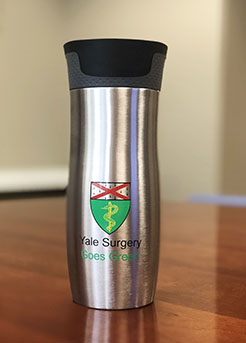
This article is the first in a mini-series about Yale faculty and staff who work at the forefront of healthcare and sustainability.
Yale surgeons have a positive impact on individual lives every day, but now they are working towards a positive impact on the environment, too. In July 2017, a group of physicians and staff members from the Yale Department of Surgery, led by Dr. Glenda Callender and Dr. Hulda Einarsdottir decided to evaluate the sustainability of their department. Now, just one year later, after efforts to improve recycling and waste management practices, the department has already earned their Green Workplace Certification from the Office of Sustainability. They look forward to building off these efforts and strive to become a leader in sustainability in the medical field, joining a growing movement across the health care industry.
Building the effort
Although the group was confronted with many opportunities for improvement, they met with a few other groups and departments at Yale to learn about their strategies to integrate sustainability. This included taking a trip across campus to Kroon Hall at the Yale School of Forestry and Environmental Studies. After sourcing ideas, the Green Team, including residents, attendings, fellows, interns, and administrative staff, started by writing a mission statement:
The importance of the health of our patients, ourselves, and our environment is manifest in our commitment to sustainability. We aim to increase wellness and reduce the carbon footprint of the Department of Surgery. Our goals include raising awareness of sustainable alternatives, encouraging environmentally conscious behaviors, and inspiring green collaborations with our colleagues in all departments.
Guided by their mission statement and inspired by lessons learned from other departmental efforts across campus, Dr. Gabriella Grisotti helped guide the team to launch campaigns around education and awareness of sustainability with a focus on recycling. To jumpstart engagement, the department supported selling 200 reusable travel mugs at a discounted rate to help motivate their department to waste less. Some sections of the department have proven better at limiting their use of disposables and some healthy competition has emerged in the office spaces.

At Yale, tackling this uniquely challenging issue involves collaboration between Yale University and the Yale-New Haven Hospital. The multidisciplinary Perioperative Sustainability Team, headed by Dr. Jodi Sherman, consists of surgeons, anesthesiologists, nurses and technicians. This group is working actively to reinvigorate recycling efforts in the hospital’s clinical spaces as part of a larger initiative to reduce clinical waste.
Moving Forward
In the coming year, the Yale Surgery Green Team hopes to continue to work on recycling awareness, but they are also hoping to address wellness in a way that benefits both health of the surgeons and staff and the environment. Surgeons and medical residents in surgery face a high-stress job and attention to the health and wellness of the group is critical. Dr. Shirley Liu is hoping to focus discussion and positive behavior change on lower meat consumption and sustainable eating practices. Dr. Einarsdottir has worked on redesigning some of the office kitchen spaces to make them more accessible and functional and the director of the residency program spearheaded an effort to install more refrigerators in resident call rooms at the hospital. These changes encourage and enable people to bring their own food in reusable containers instead of eating out and make it easier for residents to choose healthier and less wasteful options.
The team also has ambitious goals for the future. They hope to support the installation of more water fountains and water bottle fill stations in the hospital to encourage use of reusable bottles, and they would also like to refit office spaces with easily adjustable thermostats and light occupancy sensors to reduce human error in energy consumption.
All in all, the surgeons have proven that despite the unique sustainability challenges that healthcare presents, it is still possible to improve.
Yale is committed to building a more sustainable world. By doing what we do best—integrating science, the humanities, and our community—Yale creates, tests, and adopts innovative solutions to the environmental and social challenges we all face.